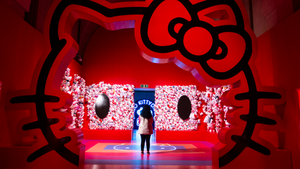Food brands remain strong as general merchandise licenses, particularly in housewares and apparel. Angela Farrugia, group managing director at The Licensing Co., says efforts on food brands are gaining momentum. In its
April 6, 2018
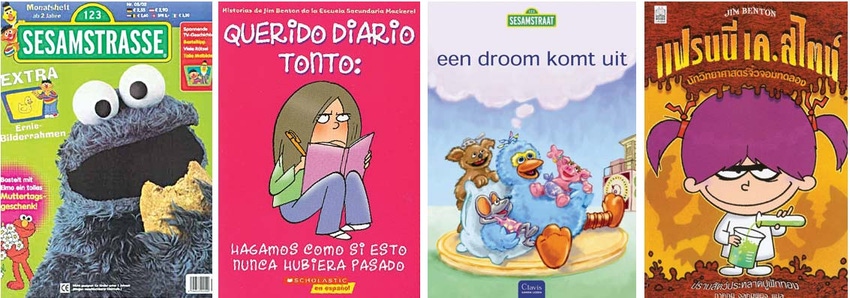
Food brands remain strong as general merchandise licenses, particularly in housewares and apparel.
Angela Farrugia, group managing director at The Licensing Co., says efforts on food brands are gaining momentum. In its Jelly Belly program, for example, the company is taking a brand that has strong appeal to teens and adding new products to make the license more comprehensive. 
TLC has added to its teenage lifestyle program by signing manufacturers that are now producing Jelly Belly-scented pillows and throws along with other bedroom products. The brand's bath product line has expanded into cosmetics and toiletries. Scented products are based on the top-selling Jelly Belly flavors. A line of Jelly Belly in-car air freshening products that launched in September appears in about 7,000 doors in chains such as Wegmans, Kroger, Pep Boys, Big Lots and Walmart.
"Other things that have done well are all the iPhone accessories we've launched including scented skins and earbuds," she says. "We went into 3,000 Walmart stores with the range recently."
The brand is translating well into global markets, too, with various Jelly Belly products doing well in Japan, Korea, Australia, France, Germany and the U.K.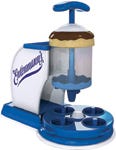
"It's a nice international spread," says Farrugia.
Further lifestyle launches in 2010 for the brand include a range of flip-flops/casual footwear and rain boots, all featuring bean patterns and motifs or scented rubber.
Another product line that has extended into general merchandise is Jim Beam. A Jim Beam "man-cave" program that features bar accessories and pool tables, among other products, has been expanding into tailgating and barbecue products, such as food smokers and charcoal grills.
Among the more novel items introduced recently under the Jim Beam license are gadgets designed to make sliders, mini burgers that have grown increasingly popular. The line complements a range of barbecue tools.
"It all looks amazing," says Farrugia. "It's really high quality and all of that is very on trend and on theme."
In a complementary product launch, TLC introduced the Kahlua license into K-cups, the capsules used in Keurig single-cup coffee makers. Three million of the Kahlua K-cups have sold since September, Farrugia says.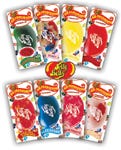
Housewares are a focus for Brand Central food licenses. Ross Misher, chief executive officer, says that the company is adding licensees for Kellogg's and its other food and beverage brands. In terms of home goods, licensees have launched activity kits for kids, including items that create Rice Krispies treats, at a time when at-home family activity items are gaining popularity.
Misher said it's evident that food licenses are becoming more popular, benefiting from being associated with traditional family comforts as consumers are centering more activities around the home. Consumers are looking for new ways to turn activities such as meal making into events, and the trend provides licensing opportunities.
"We've seen that food television shows have had a huge success with products in places like Kohl's," he says.
To that end, Brand Central has had success with cookbook licenses from brands such as Morningstar Farms, which focuses on meat substitute products. The line extension also focuses on health, another hot topic among consumers.
Food licenses are also seeing more success in apparel.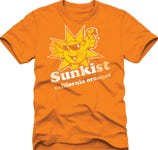
The Sunkist brand will be rolling out on T-shirts produced by C-Life Group this summer at JCPenney and other retailers, notes Aviva Rosenthal, partner at Act III Licensing.
"From the T-shirt perspective, food brands are very strong," she says. "There is a retro piece to it, but generally, food and beverage brands are strong in retail. It was more drink brands for a while, but it has expanded and now there is room for other food and beverage brands to come into play."
To an extent, traditional beverage products and comfort foods become more emotionally appealing in tough times, and certainly the recent economy could make anyone long for the good old days. The cheery sun logo and distressed look of the Sunkist T-shirt, with its underlying reference to California oranges, hits on multiple nostalgia fronts. Other T-shirt designs reflect the fruit crate art developed by members of the Sunkist cooperative over the years, artistic renditions of California agriculture that helped create an identity for each grower's operation.
Rosenthal says getting things just right is important to the grower cooperative that controls the Sunkist brand, one with a long tradition and a regard for its reputation. She notes that Sunkist-licensed products must have the right brand associations. Despite the introduction of citrus-related ingredients in the category, Sunkist doesn't do cleaning products, for example.
Fortunately, the license has two distinct modes that provide it with flexibility. Sunkist logos and motifs are associated with youth as experienced across the generations, healthy food and good fun. Sunkist growers' fruit crate art allows for a different range of products invoking Americana and cultural traditions with their illustrations.
Act III is developing kitchen decorative items applying the crate art and using Sunkist logos for juicers and related small kitchen appliances developed by Omega Products.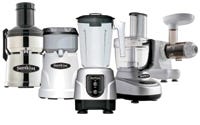
Small appliances also proved appealing to the Joester Loria Group as they manage the Entenmann's license. Donuts helped make Entenmann's famous; so one particular small appliance license application was a natural.
"We just launched the Entenmann's Donut Maker by Think Wow Toys which is expected to hit stores for fall 2010," says Joanne Loria, executive vice president at Joester Loria Group.
The donut maker produces the raw donuts, which are cooked off in a microwave. Mass-market launch is in the fall with Kmart as the initial store placement.
Line extensions for evergreen brands such as Chuck E. Cheese, Cold Stone Creamery and Mrs. Fields offer pizza, ice cream and cookie makers that lend themselves to the at-home trend. Other deals in partnership with Global Icons saw the Cold Stone name on an interactive Wii game, Hershey's on lip balms and names such as Jolly Rancher and Almond Joy licensed on candles and scent diffusers.
"In the previous three years, we licensed candles and lip balms," says Bill McClinton, Global Icons' senior vice president of licensing. Going forward, the company will shift its strategy to more core product. "Now most of the food licensing we're doing is food to food," he adds.
Candles have been an important home decorative category for food licenses.
Rosenthal says scented candles are an upcoming target for Sunkist licensing. The Mars Retail Group has inked a new licensing agreement with Star Brite Illuminations, a division of Star Candle LLC, that will incorporate M&M's characters, as well as the Starburst and Skittles brands, into the candle category. 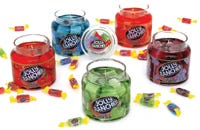
Mars also signed Advanced Graphics, Pinnacle Designs, Santa's Best and Current USA as licensees who will manufacture a variety of M&M's-branded merchandise, including cardboard standups, stationery, key chains, jewelry and Christmas items.
Recent rollouts of M&M's-branded items also include Advanced Graphics Nomad Stickup wall clings and character stand-ups.
"In this economic climate, consumers focus on evergreen brands. By bringing together two or three licensees, we can offer retailers a cohesive, differentiated plan for displays and endcaps that includes candy, novelty and gifting. We can create a miniature M&M'S World experience for any retailer at virtually any price point." says John Capizzi, general manager of licensing for Mars Retail Group.
In a move that gave it an upscale license application and a way to tout its sustainability efforts, The Coca-Cola Co., with its manufacturing partner Emeco, unveiled the 111 navy chair.
The product is a new spin on Emeco's famous navy chair, which the company began making out of aluminum for the United States Navy in 1944. The new version is made from 111 Coca-Cola up-cycled plastic bottles. The chairs go on sale in six colors this June at retailers worldwide and via email by writing to [email protected]. In the U.S., Design Within Reach, a chain with more than 70 locations in 25 stores, will be the exclusive retailer of the chair.
Food names are extending their shelf life by strategically extending their brands into new non-foods categories. Those initiatives will continue to pay off as consumers identify with the nostalgic feel and positive attributes of evergreen food brands.
You May Also Like

